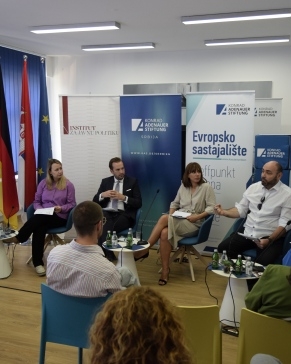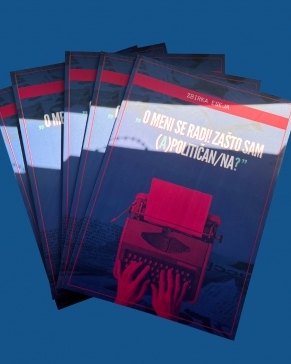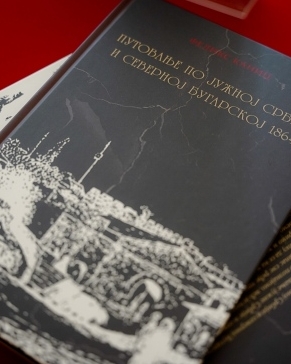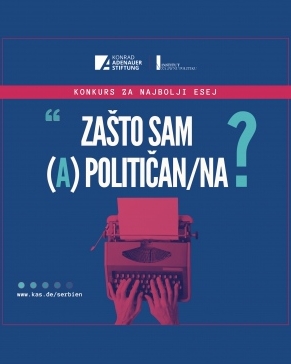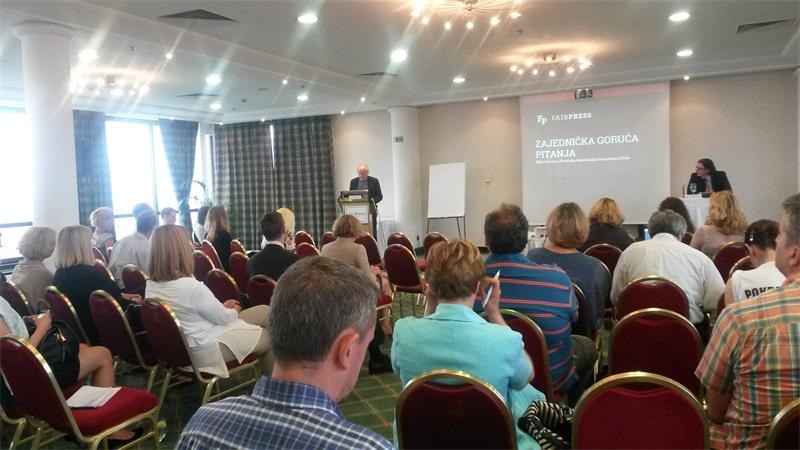
On Tuesday (8 July 2014) in Zagreb was held a conference "Who guards the guardians of democracy? Media and media environment in six countries of Southeast Europe ", which presented the first results of the study of media composition of Croatia, Bosnia and Herzegovina, Montenegro, Macedonia, Serbia and Romania. The research is the first step the four-year project which aims to establish an international mechanism for measuring clientelism in the media, respond to the problem of corruption in the media sphere and influence the change of ineffective and harmful media policies.
The conference was opened by the President of the Croatian Journalists' Association Zdenko Duka who pointed tough economic and professional status of journalists, not only in Croatia. "In Croatia,in the last six years,was lost 30 percent of journalists' jobs. Great crisis is also influencing the journalism in other countries. A positive step was made by the Italian government with the establishment of an extraordinary fund and anticipated tax benefits up to 100% for the employment of young journalists for an indefinite period, and up to 50% tax relief for employment at a specific time, "said Duke.
The presented research has shown the difficult economic situation of the media and journalists that threatens media freedom and leads to self-censorship and capturing media by politics and big capital through grants, donations and advertising funds. In addition, a significant problem in all countries is the lack of relevant and systematized data on ownership structures, market shares of the media, share of each owner in the media, media financing from public sources, the effects of regulatory and supervisory bodies and their decision and the court cases involving journalists. This allows the nontransparent effect to the legislative and regulatory framework, the appointment of supervisory and regulatory bodies, recruitment and layoffs in the media and violating professional rules and codes of journalists.
In a situation where the media is captured by the private and political interests, and journalists are threatened physically and professionally, the public interest is totally neglected. Citizens are losing trust in the media, and it is closely linked to trust in the democratic structure and values. Without honest journalism and fair and transparent rules and relations between actors in the media landscape, the democracy is threatened.
As an immediate response to this situation in the media is presented portal Fairpress.eu to be a systematic and analytical way to deal strictly with the questions and issues related to media and public interest. With the central English version, the portal brings together six national sites in the languages of the countries participating in the project. The portal will serve as a platform for the publication of high-quality journalistic texts in other media censored the topics addressed. In its original form, without editorial intervention, category UNCUT provides an opportunity to journalists victims of clientelism that using the video format of 60 minutes tell their story.
Conference "Who guards the guardians of democracy?" is a part of a project Citizens' Response to clientelism in the media (MEDIA CIRCLE), which is funded by the European IPA CSF program. The project leader is the Partnership for Social Development from Zagreb, and partners from five countries of South East Europe are: Expert Forum (Romania), Vesta (BH) BH Journalists (BiH), Public Policy Institute (Montenegro), the Center for Media activities (Macedonia) Yucom - lawyers 'Committee for Human rights (Serbia), the Independent journalists' Association of Vojvodina (Serbia). The aim of the project is to establish an independent, viable and multifaceted interstate mechanism for actively monitoring media policy, advocacy and rapid response to problems of media in South East Europe.

